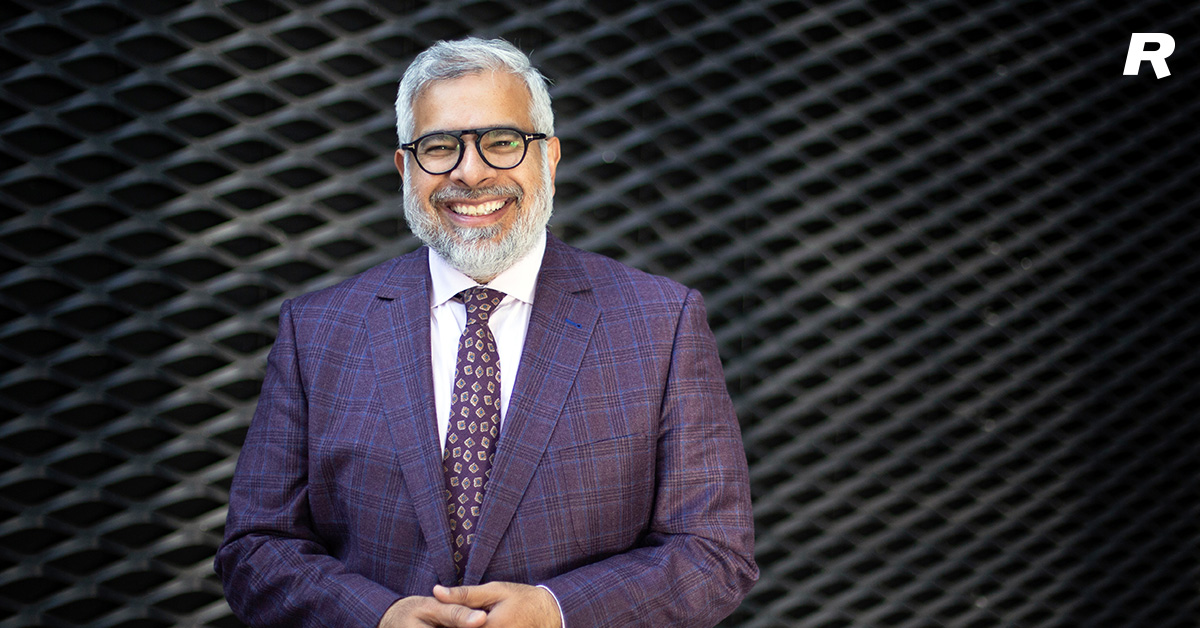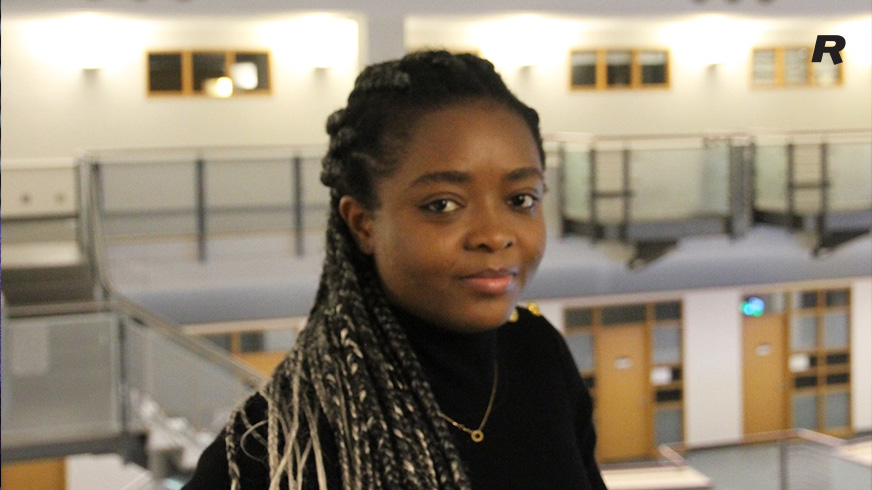During the summer of 2020, the Rotman School took a long, hard look inward.
The increased calls for racial justice and equity, instigated by the senseless killings of so many Black men and women, were a wake-up call. Many organizations realized that they needed to do more and do better.
At the Rotman School, there was a broad recognition that it was time to address issues of systemic racism and the lack of representation of Black, Indigenous and racialized persons among its student, faculty and staff populations.
“This past year has forced us to consider who does not see themselves at the Rotman School, across our programs, and how we can represent a range of lived experiences and aspirations in both what we teach and how we teach,” explains Nouman Ashraf, director of Equity, Diversity and Inclusion at the School.

Nouman Ashraf
Director of Equity, Diversity and Inclusion, Rotman School of Management
Last year, the Rotman School made a commitment to drive change across all its programs and academic areas. While work is still underway and far from over, it’s worth reflecting on the progress made during this challenging year — and the work still left to do.
Rotman started by listening
Rotman students have been key partners in driving change at the School. After a series of violent and hate-related crimes occurred across North America during the summer of 2020, many Rotman students were furious, exhausted and feared for their safety.
During this charged time, many reflected on instances in their own lives where they had been discriminated against or felt excluded because of race.
 “That summer turned us into activists,” explains Nonso Molokwu (Evening MBA ’22). “Many of us looked around and realized that there were so few students of colour, especially Black students, in our classes. We weren’t taught by professors who looked like us, and the course material didn’t feature people of colour. If we didn’t come together and push for change, nothing would happen.”
“That summer turned us into activists,” explains Nonso Molokwu (Evening MBA ’22). “Many of us looked around and realized that there were so few students of colour, especially Black students, in our classes. We weren’t taught by professors who looked like us, and the course material didn’t feature people of colour. If we didn’t come together and push for change, nothing would happen.”
He was one of many students who came together to found the Students Against anti-Black Racism (SABR) group and pushed the Rotman administration to take measurable actions towards increasing representation at the School.
“If we didn’t come together and push for change, nothing would happen.”
— Nonso Molokwu (Evening MBA ’22)
The School’s first step was to listen — really listen — to the challenges that so many students had come up against in their personal lives and at Rotman.
The conversations were uncomfortable. Students shed tears and shared painful experiences. Many cited the lack of representation in their classes and case studies, examples of past uncomfortable conversations with fellow classmates and instances where they had felt alienated.
For a few students, these conversations served as an important turning point.
“The fact that there was a platform where I was heard and supported by fellow students who were also calling for change made me realize that I had to keep sharing my experiences, no matter how uncomfortable,” explains Ehizogie Agbonlahor (Evening MBA ’22), who is a founding member of SABR group and who, along with Molokwu, will be serving as co-president of the club this year.
“It was encouraging to see that people were willing to listen, and it gave me hope that we could make some changes.”
Taking meaningful steps
Over the past year, the School did make important changes.
The School recently appointed three new Black Executives-In-Residence – Cornell Wright, Nick Chambers and Ray Williams – who, collectively, are coaching and mentoring students as well as recent graduates of the Rotman School, supporting independent study projects and sharing insights about the career experience of Black professionals in Canada.
Two new MBA electives examining Black entrepreneurship and leadership — the Black Entrepreneurial Ecosystem Project and a separate course co-organized by the BlackNorth Initiative and taught by Wes Hall — were offered for the first time in the 2020-21 academic year and will return this coming year.
The School also looked for ways to welcome more students of colour into its classrooms. In February 2021, the School hosted its inaugural Black Future Business Leaders Conference and welcomed over 400 student registrants. Rotman also introduced six new scholarships for Black students, including the Rotman African and Caribbean Business Club (RACBC) Scholarship and the Morning and Evening MBA Black Students Advancement Scholarship, where students were actively engaged as partners in launching these new scholarship funds.

“True leadership means being able to lead across different lines of diversity.”
— Ehizogie Agbonlahor, Evening MBA ’22
Throughout this past year, student clubs like SABR and RACBC organized well-attended events for students across Rotman to discuss race, discrimination and allyship. And they were meeting (and will continue to meet) with School’s administration on a quarterly basis to discuss progress on all fronts.
“We’re in a business school to acquire leadership and management skills. True leadership means being able to lead across different lines of diversity,” says Agbonlahor. “Rotman needs to be a safe place where we can learn how to do that.”
The work ahead
Though many students give credit to the Rotman administration for listening to their concerns and taking steps towards change, Susan Christoffersen, Dean of the Rotman School, acknowledges that there is more work to be done.
“If we hope to see diversity represented in the next generation of businesses and business leaders, it is our responsibility as a top-tier business school to shape this discussion and emphasize the importance of diversity to our students,” she explains.
Rotman has set out five objectives in its diversity strategy, which aim to increase pathways for marginalized groups, diversify representation, create an inclusive culture, enhance the curriculum and thought leadership on diversity, and improve the measurement needed to track diversity.
“We must take a holistic approach to tackling such a complex issue, remembering that one cannot attain diversity without inclusion,” Christoffersen adds.
Notably, Rotman is currently engaged in a focused search for a new senior Black or Indigenous faculty member.
In its efforts to feed the academic pipeline, the School will be investing in the development of new Black and Indigenous management scholars. There are also plans to launch a research opportunity program focused on helping racialized students connect with faculty across U of T and prepare for graduate studies.
Other areas of the School are actively looking for ways to make student and learning experiences more enriching and representative of a diverse range of experiences. The Rotman Equity Diversity and Inclusion (REDI) committee is currently developing systems to encourage and facilitate greater inclusion of cases and of other course materials featuring diverse protagonists. As well, the EDI office (EDIO) is working with alumni relations, advancement and executive programs teams to develop a new database so that faculty and students can more easily connect with diverse alumni and partners — with the hope of bringing more diverse guest speakers, student mentors, club advisors and case competition judges into the School.
“We need to set difficult targets for ourselves around representation, recruitment and retention, especially if we continue to uphold our mission of producing well-rounded and thoughtful leaders,” explains Ashraf.
Most important of all, he is adamant that the School continue engaging in challenging and complex conversations around race, equity and representation.
“A lot of people refer to this last year as a reckoning. I see it differently. This year has put a microscope on the fact that the structural, systemic and strategic pieces that perpetuate biases and discrimination have been ignored for too long,” explains Ashraf.
“I think that we're getting better at this and we are moving in the right direction precisely because of our ability to dialogue — more specifically, our ability to hold our perspective at bay and entertain ideas that feel quite challenging to us in the moment.”
Ultimately, at the core of all this work, Rotman students, alumni and faculty are trying to create a sense of belonging.
“This has to be a place for everyone. Everyone — students, faculty, staff — should feel that they choose Rotman as much as Rotman chooses them,” says Ashraf. “We have to move away from these conversations about ‘cultural fit’ and towards discussions about cultural contribution — where everyone feels like their various experiences, insights, challenges and grievances are respected and heard.”
Agbonlahor agrees, adding that her greatest hope for Rotman is “that everybody can feel safe and proud of whatever makes us different, and where we’re free to become our best selves as leaders.”
Though it might take a while to see the changes they envisioned, the students sincerely hope to see future diverse Rotman classes being taught by instructors of colour.
“We’re counting on the School to do the hard work and live up to the promises it has committed to,” says Molokwu. “Our end goal is to leave Rotman a better place than we found it.”
— Rebecca Cheung